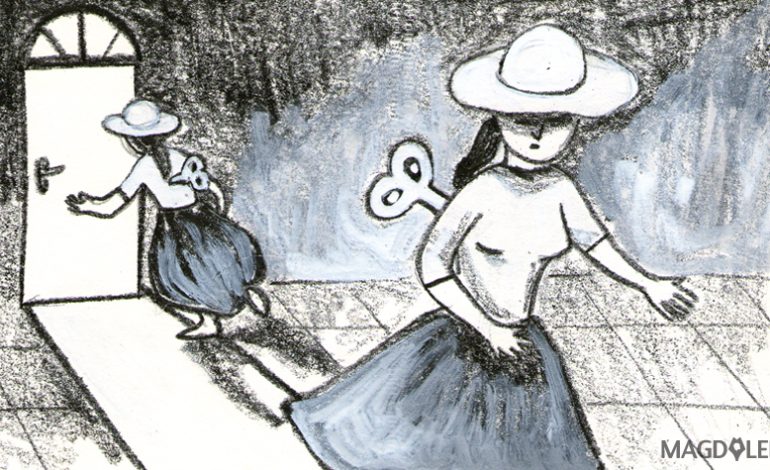How I Discovered and Dismantled My Internalized Sexism

“What’s the point of getting your master’s degree when you’re about to get married?”
For many women who express their intention to pursue further education, this sexist question may be one of the most common reactions they receive. Sexist because the same question would not likely be directed towards a man with similar intention.
I write this article to reflect on my experience when I decided to pursue my master’s degree overseas. It’s a reminder that gender-based discrimination are experienced by women on a daily basis and is incremental, causing adverse effects on the victims. Most important, it affects the way a woman thinks of herself.
Central to my story was the fact that I was granted a scholarship for a graduate school abroad. In Indonesian culture, a married woman is expected to live with her husband to show her devotion to him. I was faced with these options: getting married before I departed for my studies and leaving my husband afterward; getting married after I return from my studies, which means I will be pass the age that a woman is expected to marry; or turning down the scholarship offer and buried my dreams of pursuing a graduate degree.
Some of my relatives made comments on my marriage plans. They talk about my boyfriend’s family’s opinion on the matter, when we would get married, and whether or not I would work afterwards. To them, I wasn’t grateful enough for having a boyfriend who is a husband material. I have always been fond of learning and I value equal education access for girls, but it dawned on me that my circumstances gave the impression that I was a smart, complicated, albeit difficult woman.
I knew something was not right but was confused. After a couple of weeks, I started to feel angry. Every comment made me feel as if I was being judged like a criminal – my freedom at stake. I found deeply rooted sexist beliefs in different layers. The higher my education, the more ambitious a career pursuit I have, and the more likely I would neglect my natural duties of managing the household. It didn’t matter that within my family, there are women who break these stereotypes, a woman who had to juggling work with childrearing and other domestic duties, another one who fought for survival after having been subjected to domestic violence, and yet another woman decided to stop working after 10 years to be a full time homemaker.
In the end, after discussion and some confrontation I accepted the scholarship.
Also Read: Married Womens Dilemma Having Children or Pursuing Higher Education
The unseen dimension of internalized sexism
I thought everything was going right, until I suddenly felt guilty. Although my family had eventually accepted my choice, they showed signs of disappointment. I felt unease whenever my parents were asked about it, and felt ashamed that they had to respond that their daughter was prioritizing a master’s degree over a conventional family life.
At some point my confidence level slumped as I could not properly appreciate my achievement and doubted my capabilities. I knew that I made the decision consciously and that I had no regrets for it, yet I wondered why I felt at fault.
What did I do wrong? Am I wrong? Or am I just not mentally strong?”
How could someone internalizes such blatant gender-based discrimination when she is experiencing the very discrimination that she loathes.
I started reading more about everyday sexism that women experience, and its impacts on mental health, and found two possible interconnecting factors: internalized sexism and interpersonal problems. Deep down I still held sexist patriarchal beliefs that I’d learned from a young age and which had subconsciously guided my way of life.
A good life for women means not getting married too late, not being away from their husband, being responsible for domestic matters, and not working. Women having to sacrifice is good. Though my values have upgraded and my perspectives on how I prefer to be treated have changed, subconsciously, I was racked with an internal conflict. Self-blaming and self-criticizing became the automatic responses to process this internal conflict, as I felt unable to attain the ideals.
Also Read: Married at 21 Can I Still be Called a Feminist
At the same time, my approach to maintaining my relationships with other people was focused on the desire for recognition and the need for validation, particularly from my family. Internalized sexism can intersect with many other aspects, like cultural and religious values, thus if I did not hold the same accepted values anymore, I would gain the least support from my significant others. Being seen as a complicated, difficult, ungrateful person was a stain on my reputation as a “nice, obedient girl”.
However, not being afraid of it is essential in the fight against sexism.
As fate would have it, the pandemic COVID19 ended up delaying my schooling plan. And two months ago, I decided to get married. But even after our wedding, the debate continued over what I should do.
“Don’t be away too long, think about your husband.”
“Don’t forget to come home and focus on building a family?”
“What happens if you get pregnant? It’s better to let go of the scholarship now.”
Over time I’ve learned to tune out this kind of comments. My husband and I had a discussion and we’ve reached an agreement to support each other on this issue and others in the future.
Women’s responses to practices of sexism are varied. Some confront, some are silent, and others are in between, trapped in the struggle to make sense of the experience. As I wrote this piece, I realized the hidden damage of internalized sexism, and validated my thoughts and feelings towards what had happened to be able to navigate forward. I was alone, yet not the only one in this battle. Challenging sexism in society through education is a must, but it is also important to combat sexist beliefs ingrained inside us, starting from recognizing our own voices and internalized values.
The progressive Muslim scholar Nur Rofiah said in one of her online Islamic Gender Study sessions, “We all are the children of the patriarchy, but we can choose to be defiant.”
For those who have deeply internalized everyday sexism, I hope you’ll find ways to dismantle it and walk on your own desired path.






















